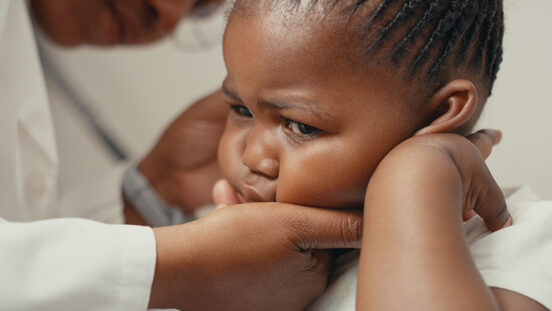Eczema in children: How to relieve their painful itching
One mum shares her story.
Eczema affects many children, in fact new research from the University of Melbourne has found that nearly 40 percent of infants live with this skin condition. But unfortunately, many still struggle with it even as they enter adulthood.
According to the Eczema Association Australasia (EAA), eczema usually appears early on, particularly in babies between two-to-six months of age and disappears around the time they turn six years old.
We take a look at one mum's real struggle with her son's painful flare-ups and how to help children struggling with the eczema itches.
Real life: “My son scratched himself until he bled.”
Sydney mum Dilik Ozer Cirpici noticed something wasn't right with her little boy when he was around two months old.
"The way we noticed it was when he would wake up in the middle of the night crying and he was too little to be able to move properly so he couldn't even scratch himself. But then as soon as his motor development started to evolve and he was able to move his hands, he would scratch himself until he bled," Dilik exclusively tells Now To Love.
Dilik and her husband tried everything from steroid cream to cutting out food groups like gluten and spent thousands on doctors and specialists. They later found out that it wasn't diet related, but the eczema remained a problem.
Even if they went for more than a week without moisturising, his eczema would flare up and he would start bleeding, particularly on areas such as the the crease of his elbows or his knees and his earlobe.
"It's always the left ear, we realised that when there were a few spots of blood on his pillow or on his mattress. We thought 'What's happened? Has he been bleeding through his nose?' but it turned out it was the eczema on his ear. While he's sleeping, he is unconsciously scratching and we can't keep control of that at night."
These big name celebrities suffer from eczema, just like us!

Dilik's son has to wear long sleeves even in summer to stop himself from scratching.
Even though the steroid creams worked, Dilik didn't want to use them on her little boy for such a lengthy period of time.
"You try to do the right thing as a mum to not put more really strong chemicals on them, but that's the only thing that really relieves it if it gets that bad."
But that's when they discovered the MooGoo range of creams, which to this day, have helped soothe pain from eczema.
"We used to bathe him every day but now we only bathe him twice or three times a week as it's not good for the skin. Once we started using the MooGoo products, that's helped to maintain his good skin health for the longest period we've ever seen. We now sometimes go for a few months without using steroid cream," Dilik says.
READ MORE: How this young Sydney woman cleared her severe, itchy eczema overnight.
Dilik's little boy still has some flare-ups every now and then, especially in winter, but she and her husband now know that moisturising is the number one way to protect him.
"We haven't had a massive rash or flare-up for almost a year now," she admits.
Though there are still some measures of caution that need to be taken. To stop his scratching habit, Dilik makes sure he always wears long sleeves and is careful about where he plays.
"When we take him to the beach, we have to be careful with the amount of times he spends on the sand or in the water because it could have an impact on the status of his eczema," she says.

With frequent moisturising, Dilik's little boy is in a lot less pain.
How to manage your child’s eczema
For any parents facing a similar problem, Dilik's number one piece of advice is to be very alert early on and learn that "the maintenance stage is forever."
"We tend to think that if there's no rash or flare up, we don't have to moisturise as often as we used to," she says.
"We've learnt the hard way, unfortunately, that when we stop moisturising or if we do so less than twice a day (morning and evening), there are breakouts of eczema. Keep maintaining until they are old enough to be diagnosed with the reason behind it whether it's a food allergy, asthma or something else."
In the meantime, some top tips from the EAA include:
- Keeping fingernails short to prevent scratching from breaking the skin and wear cotton mitts or gloves at night
- Wearing 100 percent cotton or soft fabrics – avoiding rough, scratchy fibres and tight clothing
- Having lukewarm baths and showers
- Using hypoallergenic products and avoiding anything perfumed
- Avoiding rapid changes of temperature and activities that raise a sweat
- Reducing dust mites




